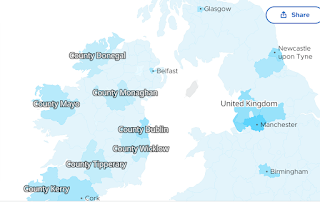1/17/22 Dwight talked to Margaret McCarrell---
A professor from University of Tennessee came to the house and found holes in the door that James McCarrell used for the loom. Margaret has also seen a diary that James kept which included the bills he had for yarn that he bought to use in the loom. "In his own hand", he states in that diary that he was born in Ireland. Being of Scottish descent, many mistakenly have him listed as being born in Scotland.
From Cousin Dwight, the grandson of Margaret Viola Graham-Blake..
1/16/2022
I think the loom was integrated onto the fireplace mantle and walls, with a series of hooks. That is, if I remember correctly.
Actually, this was the time period when England was taking over India, and also the first beginings of mechanization that would lead to the Industrial Revolution. They were making weaving more efficient, and also had cheaper labor in India. This lead to a gradual and long decline in the weaving industry of Northern Ireland. Jobs became harder and harder to find, as the same out put required less workers. So, the McCarrells and McKibbens, and presumable the Caswell Grahams, migrated to find new economic opportunties.
James McCarrell was also a minister. But, he found his calling in choir and singing. He lead the church in singing and music.
I think most genealogist would never have caught that it was James McCarrell Sr. (b. 1728) who was the father of all those young children. However, it was all recorded in the Bible [which Margaret McCarrell had at one time]. The only record that survived to prove this all.
There are alot of legends that I need to write down… There was another. He got the deed to his land in Knoxville in about 1800. He had to ride a horse all the way to Nashville to get it, as that was the only place where the deeds were issued. He then rode back by horse, and the very next day he took that original deed to the Knox County Court house and made sure that it was entered there also. There is a record of this special effort that he took. He must have been 75 years old when he made those journeys by himself…
For more on the McCarrell Bible, click here
All these photos of the McCarroll/McKibbon Homestead: Somewhere when I put these all on Ancestry.com I told that they are all courtesy of Marcy Carter Lovick......






